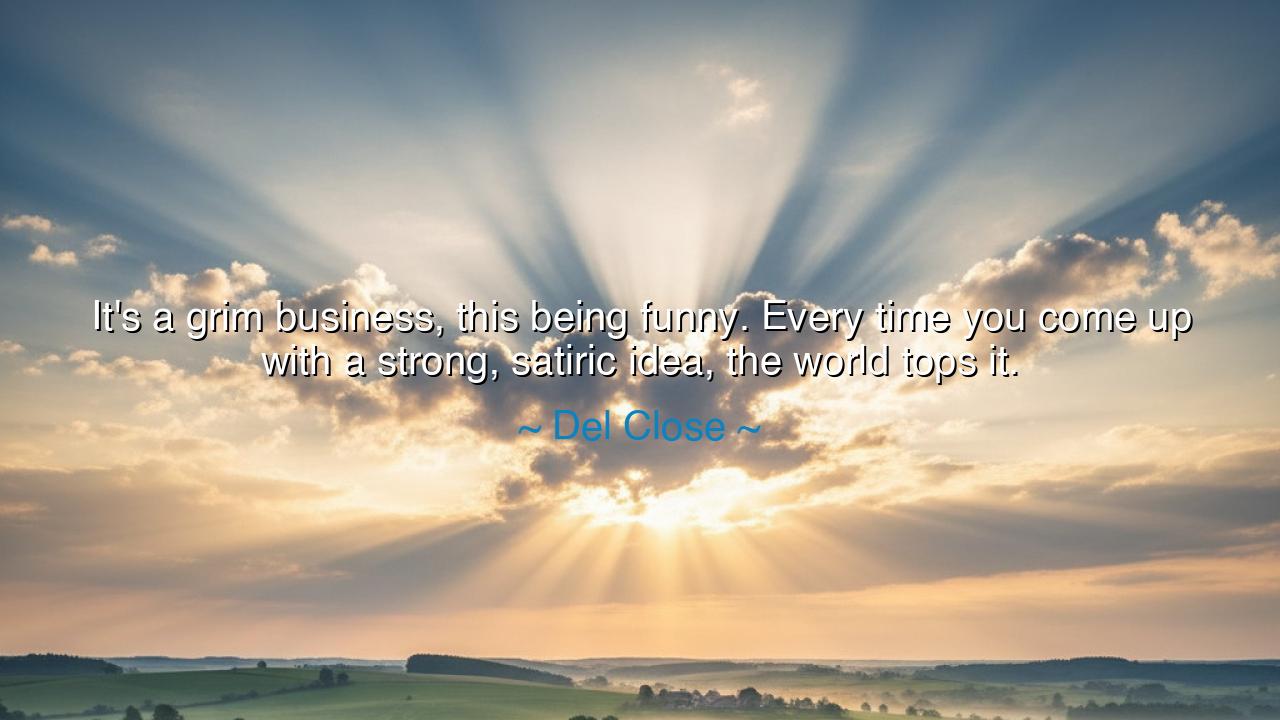
It's a grim business, this being funny. Every time you come up
It's a grim business, this being funny. Every time you come up with a strong, satiric idea, the world tops it.






When Del Close, the sage of modern comedy and the mentor of generations of jesters, declared, “It’s a grim business, this being funny. Every time you come up with a strong, satiric idea, the world tops it,” he spoke not merely of humor, but of the deep sorrow and awe that lie beneath the craft of laughter. His words echo like an oracle’s lament—an admission that in an age where truth grows stranger than imagination, satire itself struggles to keep pace. For what can the fool jest about, when the world itself performs its own absurdities more boldly than he ever could?
To be funny, in the truest sense, is not to mock idly—it is to gaze unflinchingly into the chaos of existence and reflect it back with wit and truth. The fool and the philosopher are brothers; both see what others refuse to see, and both must bear the weight of seeing too much. Del Close understood this burden. He was no mere entertainer; he was a prophet in the theater of madness, the architect of improvisation, where truth and absurdity dance hand in hand. In his world, comedy was not escape—it was revelation. Yet he called it grim, because every joke born of truth reveals not only laughter, but the pain and folly of mankind itself.
In the ancient courts of kings, it was the jester who alone could tell the truth. When all others trembled before the throne, the fool could speak freely, cloaked in humor. His laughter was both shield and sword, disarming pride while cutting through deceit. Yet the jester’s heart was never light, for he saw the rot beneath the crown, the vanity beneath the glory. So too did Del Close and those of his art—those who crafted laughter out of tragedy, who stood before the roaring crowd and disguised truth as jest. It is indeed a grim business, for behind every jest lies a mirror reflecting the face of a troubled world.
Consider the tale of Jonathan Swift, who once wrote A Modest Proposal, suggesting that the poor of Ireland might ease their suffering by selling their children as food. The world was horrified, and yet it was precisely the horror he intended. For through this savage humor, he forced his readers to see their own cruelty—to realize that society’s indifference was already monstrous. Swift’s satire was strong, yet as Del Close warned, the world topped it: cruelty, greed, and absurdity continued, even surpassed the parody. When reality begins to outdo the imagination of its satirists, we enter an age of dark irony—an age when laughter becomes a cry for help.
And so it is today, and so it has always been. The comedian—like the prophet or the poet—lives on the edge of despair, searching for light amid the noise. He turns the pain of the world into a language people can bear to hear. But what happens when the world itself becomes the joke? When truth outpaces imagination? That is the grimness Del Close spoke of—the weariness of one who sees the absurdities of power, the hypocrisy of men, and the decay of sense, and realizes there is no punchline left strong enough to contain them. To be funny, then, is to wrestle with futility, to craft meaning in a time when madness reigns.
Yet within this grimness, there is still nobility. For laughter, even in dark times, is resistance. It is the flame that flickers defiantly against despair. The satirist does not laugh because the world is simple; he laughs because it is unbearable—and yet he still dares to face it. In every jest that unmasks hypocrisy, in every story that exposes folly, he reclaims a measure of sanity for us all. Del Close, with his teaching of improv and his reverence for honesty, handed his disciples a sacred charge: “Follow the fear.” To create meaning even when the world mocks the effort, to laugh not from ignorance, but from understanding.
So, let this be the lesson carried forward: Do not dismiss laughter as mere levity. Humor is the armor of the wise, forged in the fire of sorrow. When the world grows absurd, do not despair—laugh, but let your laughter be clear-eyed and fearless. Speak truth, even when the truth feels grim. If you would be funny, be brave enough to see the darkness, and still choose to create light. For though the world may outdo our satire, it can never extinguish our spirit. And in that unbroken laughter, as Del Close knew, lies both rebellion and redemption—the laughter of those who still dare to hope.






AAdministratorAdministrator
Welcome, honored guests. Please leave a comment, we will respond soon